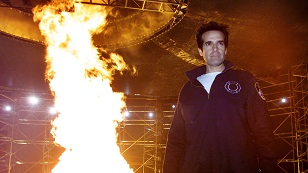This is mark Joseph “young” blog entry #480, on the subject of Versers Think.
With permission of Valdron Inc I have previously completed publishing my first nine Multiverser novels,
- Verse Three, Chapter One: The First Multiverser Novel,
- Old Verses New,
- For Better or Verse,
- Spy Verses,
- Garden of Versers,
- Versers Versus Versers,
- Re Verse All,
- In Verse Proportion, and
- Con Verse Lea,
in serialized form on the web (those links will take you to the table of contents for each book). Along with each book there was also a series of web log posts looking at the writing process, the decisions and choices that delivered the final product; those posts are indexed with the chapters in the tables of contents pages. Now as I am posting the tenth, In Version, written in collaboration with Eric R. Ashley, I am again offering a set of “behind the writings” insights. This “behind the writings” look may contain spoilers because it sometimes talks about my expectations for the futures of the characters and stories–although it sometimes raises ideas that were never pursued, as being written partially concurrently with the story it sometimes discusses where I thought it was headed. You might want to read the referenced chapters before reading this look at them. Links below (the section headings) will take you to the specific individual chapters being discussed, and there are (or will soon be) links on those pages to bring you back hopefully to the same point here.
This is the third post for this novel, covering chapters 25 through 36. The first post, #476: Versers Deduce, covered chapters 1 through 12, and the second, #478: Character Conflicts, covered 13 through 24. There is also a section of the site, Multiverser Novel Support Pages, in which I have begun to place materials related to the novels beginning with character papers for the major characters, giving them at different stages as they move through the books.
History of the series, including the reason it started, the origins of character names and details, and many of the ideas, are in earlier posts, and won’t be repeated here.
Quick links to discussions in this page:
Chapter 25, Kondor 227
Chapter 26, Brown 251
Chapter 27, Slade 220
Chapter 28, Beam 167
Chapter 29, Kondor 228
Chapter 30, Beam 168
Chapter 31, Slade 221
Chapter 32, Brown 252
Chapter 33, Kondor 229
Chapter 34, Beam 169
Chapter 35, Slade 222
Chapter 36, Kondor 230
MJ opened this chapter putting forward the notion that Joe was going to question the spy, and the suggestion that Zeke would do the language link/mind reading combination to tell whether the bird was telling the truth.
Eric made some suggestions which made sense. MJ decided that the prisoners would be locked in cages in the on-campus zoo that had been mentioned in the previous book, as the easiest place to secure them.
This chapter may have gone through a dozen rewrites, because we couldn’t make sense of Derek cracking the language. Eric headed in the direction of building a database of words used by the aliens, and trying to make sense of their communications based on matching words to the movements of the ship. MJ, meanwhile, thought this didn’t really fit the known facts, that the ship had departed from the same original location as The Wanderer from which Derek and his spaceship and robot had just come–the languages would have been the same then, and any change would be strictly in pronunciation. That, though, proved the key: the computer would still be spelling everything the same way, but as with English the pronunciation would have changed, and that meant that Derek’s computer could communicate with the visitors’ computers because they would be sending encoded text messages to each other, and generational changes in pronunciation wouldn’t matter.
Eric came up with the idea for the EMP, but used it to give Derek more vocabulary. MJ adapted it to identify the coordinates of the university on the visitors’ grid, and so begin to put together the latitude/longitude system being used by the visitors.
This surprise came from Eric, and we probably don’t know where it’s going. After all, all his current opponents are either avians or little green men, so he would be guessing concerning where their nerve junctions are. However, there’s a reasonable chance this will come to something in the future.
MJ realized that Sophia was going to be very uncomfortable trying to sleep with the knowledge of those monsters in the basement, and so would want to sleep with Beam; he then realized that the opportunistic Beam would use this to get both wives in the same bed with him.
Eric’s original vision of this Wheel of Trade was that he was reading about the world of Mary Piper Alpha, the primitive sailing vessel, and he made it a religious object with the suggestion of some kind of god of commerce. The big problem MJ observed was that although Kondor had that tablet when he arrived at that world, that world didn’t have any computers so he couldn’t have gotten a data version of the history, and any history of that world he did have he would have written himself. The passage was recast to suggest that this was in Mary Piper Beta, and the religious aspects blunted since there is no hint of religion in the original world descriptions or Kondor’s visits there.
We hit a minor snag, because although Zeke has had some training with primitive weapons and is a below average amateur, he doesn’t actually own any such weapons. A bit of rewrite arranged for him to borrow swords from others.
Eric had suggested that Beam would fight another batch of zombies, but MJ actually finds it difficult to write interesting combat scenes and thought it more interesting to have them arrive and eat their own dead.
At this point MJ outlined a plan for the next four chapters which would bring the parakeet world story to a turning point. It was important as a first step that we create the feeling of a bit of time passing.
This chapter was intended to cover a lot more, but it was getting cumbersome so MJ ended it at a point at which it made some sense to switch to Kondor; the cliffhanger at the end of the next chapter was supposed to be the end of this one. Then the outline called for Beam and then Kondor, but that Kondor chapter was really about observing Derek’s communication with the aliens, so it was simple enough to change it to Slade.
This was the second half of what was going to be in the previous Brown chapter, expanded a bit. As mentioned, the cliffhanger message was supposed to end the Brown chapter, but MJ needed to make it two chapters to prevent the feeling that it was rushed.
This was a joint effort. MJ suggested that Bob would levitate a cow over and drop it, and that Sophia, the fire mage, might have some spells to cook it and to preserve it. Eric wrote the first draft of the chapter and created most of the detail, although MJ edited some of it out and made a few minor changes.
We had discussed this and considered it for quite a while before we reached this point, and so had been working toward it, but it was pretty much a last minute decision to make it a Slade chapter, mostly because we hadn’t had one for a while. MJ thought that contact from someone claiming to be an officer of a sister ship would at least stall the visitors, but as this was written we had not figured out what would happen next.
Eric had suggested a confrontation with an ambassador upset about the versers revealing the location of some secret facility, and MJ had said if it was going to happen it had to be here. Over the course of a day that went from MJ recommending an outline to expanding it to a chapter that spilled over into the next chapter.
This has been the third behind-the-writings look at In Version. If there is interest and continued support from readers we will endeavor to continue with more behind-the-writings posts and another novel.









